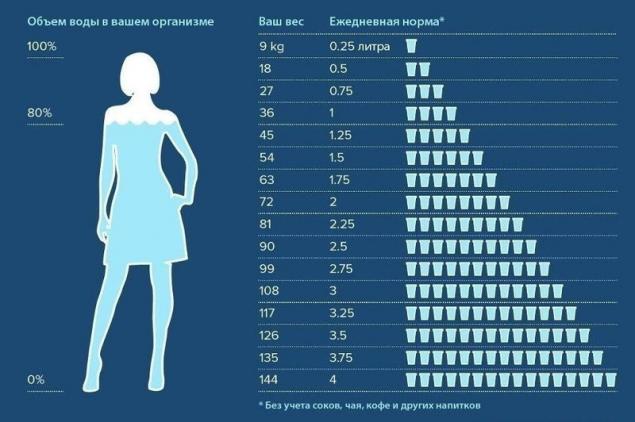How to drink water and how much
 Bashny.Net
Bashny.Net
Water is an integral part of any cell, the liquid base of blood and lymph.
In the body, it performs several important functions:
Water has high heat capacity and thermal conductivity, which contributes to the processes of thermoregulation.

Distribution of water in the body
The water content in various tissues as follows:
It follows that, in General, thin people in the body is less fat, more muscle, more water.
Men water is 60%, women – 50% of body weight.
In the elderly (over 60) in the body contains 50% water in men and 45 in women.
In infants , the figure is 65 – 80% of body weight.
The total water content in the body turns the water inside the cells (cellular fluid – 40%, i.e. 2/3 of all water in the body) and outside the cells (extracellular fluid – 20%, i.e. 1/3). Outside the cells the water enters the vessels (5%) and extracellular space (15%).
Thus the man weighing 70 kg, the total content of body water is approximately 42 liters, while in the cells contains 28 l, and outside the cells – 14 L.
Interstitial (intercellular) water is 10.5 l, intravascular (blood plasma) – 3.5 liters In the normal blood plasma is 93% water and 7% from proteins, lipids (fats) and other substances. The plasma volume is a vital indicator to ensure normal blood circulation, and therefore the normal blood supply to all tissues and organs.

The water balance in the body
The water content in the body provides the balance of its income (including its intracellular formation) and excretion.
On average, adults should be water:
Only 2500 ml/day.
Average losses of water are:
Only 2500 ml/day.
Large water losses occur when:
Increased body temperature and high calorie foods promote the release of water through skin and lungs.
It should be remembered that the excessive consumption of salt increases the excretion of water by the kidneys, thus, be displayed and the excess of salt.
Of course, when the flow rate increases, the body needs additional water ingress from the outside. The average healthy adult is recommended to drink 1.5 – 2 liters of fluid per day.

How is the distribution of water in the body?
Our body has a complex control system.
In the blood vessels of the hypothalamus, which is located in the brain, there are osmoreceptor. If the water content in the body decreases, is an increase in the concentration of salts in the blood plasma, and osmoreceptor immediately signal about it.
In addition, in the oropharynx also has receptors that report dryness of the mouth. Their signals are perceived by us as the feeling of thirst. The use of water reduces thirst first, due to the wetting of the receptors in the oral cavity, and then through the dilution of salt concentration in the blood plasma.
The most important hormones regulating water balance is antidiuretic hormone (anti – against, diuresis – urination) secreted by the hypothalamus. The function of this hormone is to maintain a certain concentration of salts and plasma volume of blood. Without this hormone about 18 l of fluid per day is lost with urine, which would lead to a sharp dehydration.
On the day we istrazivaca about two liters of water. Overall, this is the minimum amount of fluid that should always be filled.
For a good water-salt metabolism in the body needs normal functioning of the kidneys. A day the kidneys filter 180 l of plasma. Because of urine per day is allocated only 1.5 – 2 l, a kidney back absorbed 99% water and salts.
Sufficient water is the only way to ensure the access of nutrients to every cell of the body!

How to drink and how much?
Waking up in the morning, drink at least two glasses of water to compensate for fluid loss during sleep.
Optimal time of reception of water: a glass for 20-25 minutes before eating and a glass after 1 — 1.5 hours after a meal is the minimum water needed by the body.
It is not recommended to drink water directly during meals. During meals is recommended to drink acidic drinks, contributes to optimal digestion.
Also interesting: Important! Alarms lack of water in the body
How to cook healthy water from fruits and herbs
The physiological norm of consumption of water: 30 — 40 ml per kilogram of body weight daily.
P. S. And remember, only by changing their consumption — together we change the world! ©
Source: vk.com/wall-23903469?w=wall-23903469_4149
In the body, it performs several important functions:
- it dissolves many chemicals
- she is actively involved in metabolic processes,
- with its help it stand out from the body metabolic products.
Water has high heat capacity and thermal conductivity, which contributes to the processes of thermoregulation.

Distribution of water in the body
The water content in various tissues as follows:
- lungs, heart and kidneys – 80%,
- skeletal muscles and brain 75%,
- skin and liver – 70%,
- bone – 20%,
- adipose tissue – 10%.
It follows that, in General, thin people in the body is less fat, more muscle, more water.
Men water is 60%, women – 50% of body weight.
In the elderly (over 60) in the body contains 50% water in men and 45 in women.
In infants , the figure is 65 – 80% of body weight.
The total water content in the body turns the water inside the cells (cellular fluid – 40%, i.e. 2/3 of all water in the body) and outside the cells (extracellular fluid – 20%, i.e. 1/3). Outside the cells the water enters the vessels (5%) and extracellular space (15%).
Thus the man weighing 70 kg, the total content of body water is approximately 42 liters, while in the cells contains 28 l, and outside the cells – 14 L.
Interstitial (intercellular) water is 10.5 l, intravascular (blood plasma) – 3.5 liters In the normal blood plasma is 93% water and 7% from proteins, lipids (fats) and other substances. The plasma volume is a vital indicator to ensure normal blood circulation, and therefore the normal blood supply to all tissues and organs.

The water balance in the body
The water content in the body provides the balance of its income (including its intracellular formation) and excretion.
On average, adults should be water:
- about 1600 ml of water — liquid,
- 700 ml – with food,
- 200 ml is formed in the breakdown of carbohydrates and fats.
Only 2500 ml/day.
Average losses of water are:
- 1 500 ml – through the kidneys,
- 500 ml through the skin (400 ml evaporation and 100 ml of perspiration),
- 300 ml – through the lungs
- 200 ml – through the digestive tract (stool).
Only 2500 ml/day.
Large water losses occur when:
- sweating,
- emergency breathing (exercise),
- burns,
- diarrhea,
- vomiting,
- increased urine flow.
Increased body temperature and high calorie foods promote the release of water through skin and lungs.
It should be remembered that the excessive consumption of salt increases the excretion of water by the kidneys, thus, be displayed and the excess of salt.
Of course, when the flow rate increases, the body needs additional water ingress from the outside. The average healthy adult is recommended to drink 1.5 – 2 liters of fluid per day.

How is the distribution of water in the body?
Our body has a complex control system.
In the blood vessels of the hypothalamus, which is located in the brain, there are osmoreceptor. If the water content in the body decreases, is an increase in the concentration of salts in the blood plasma, and osmoreceptor immediately signal about it.
In addition, in the oropharynx also has receptors that report dryness of the mouth. Their signals are perceived by us as the feeling of thirst. The use of water reduces thirst first, due to the wetting of the receptors in the oral cavity, and then through the dilution of salt concentration in the blood plasma.
The most important hormones regulating water balance is antidiuretic hormone (anti – against, diuresis – urination) secreted by the hypothalamus. The function of this hormone is to maintain a certain concentration of salts and plasma volume of blood. Without this hormone about 18 l of fluid per day is lost with urine, which would lead to a sharp dehydration.
On the day we istrazivaca about two liters of water. Overall, this is the minimum amount of fluid that should always be filled.
For a good water-salt metabolism in the body needs normal functioning of the kidneys. A day the kidneys filter 180 l of plasma. Because of urine per day is allocated only 1.5 – 2 l, a kidney back absorbed 99% water and salts.
Sufficient water is the only way to ensure the access of nutrients to every cell of the body!

How to drink and how much?
Waking up in the morning, drink at least two glasses of water to compensate for fluid loss during sleep.
Optimal time of reception of water: a glass for 20-25 minutes before eating and a glass after 1 — 1.5 hours after a meal is the minimum water needed by the body.
It is not recommended to drink water directly during meals. During meals is recommended to drink acidic drinks, contributes to optimal digestion.
Also interesting: Important! Alarms lack of water in the body
How to cook healthy water from fruits and herbs
The physiological norm of consumption of water: 30 — 40 ml per kilogram of body weight daily.
P. S. And remember, only by changing their consumption — together we change the world! ©
Source: vk.com/wall-23903469?w=wall-23903469_4149
Tags
See also
How to use water in the heat?
How water fasting works in the body
How to take a bath
Learn how to drink soda and water for health
Cardiologists claim that we drink water at the wrong time. That's when you have!
How to eat during training

















